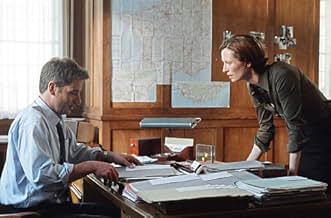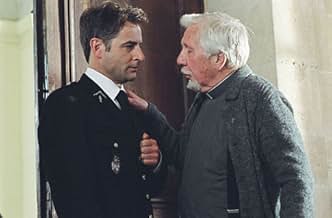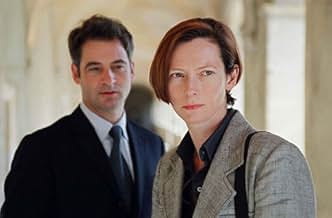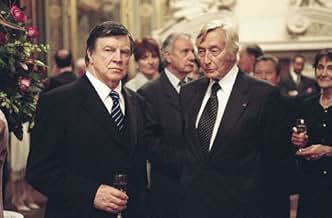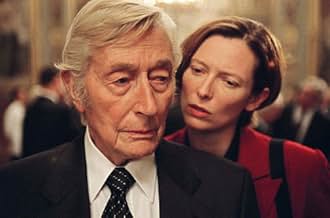PUNTUACIÓN EN IMDb
6,2/10
5,7 mil
TU PUNTUACIÓN
Un ex verdugo nazi se convierte en objetivo de sicarios e investigadores policiales.Un ex verdugo nazi se convierte en objetivo de sicarios e investigadores policiales.Un ex verdugo nazi se convierte en objetivo de sicarios e investigadores policiales.
- Dirección
- Guión
- Reparto principal
- Premios
- 4 premios en total
David de Keyser
- Dom André
- (as David De Keyser)
Reseñas destacadas
I dare say this film would have been much better received had it cast the film logically rather than have 'everybody's favourite Cockney' Michael Caine playing somebody called Pierre Boussard - I mean, Caine has never struck me as a "Pierre" somehow. And we can say for sure, that it couldn't have done any worse, a $22m financial loss is testament to that.
Of course I realise the book is in English, but there is a big difference between the two mediums and very rarely does a film pull off a stunt like this, see 'The Hunt For Red October' or Jude Law's Russian misfortune in 'Enemy At The Gates'. At least The Statement didn't slip into having Caine and co. adopt Gallic accents - that would have been too much to bare.
As for the film itself, it seemed a complete waste of police time to have half of the French PD chasing round after an OAP with a heart condition who'd been *ordered* to kill seven people 50 years earlier during German occupation. And for the film to set itself up as some sort of chase thriller, it very rarely gets past a stroll and the tension never really reaches the levels it should do.
All that said though, there are far worse films out there and this isn't an altogether bad way to spend 2 hours. 6/10
Of course I realise the book is in English, but there is a big difference between the two mediums and very rarely does a film pull off a stunt like this, see 'The Hunt For Red October' or Jude Law's Russian misfortune in 'Enemy At The Gates'. At least The Statement didn't slip into having Caine and co. adopt Gallic accents - that would have been too much to bare.
As for the film itself, it seemed a complete waste of police time to have half of the French PD chasing round after an OAP with a heart condition who'd been *ordered* to kill seven people 50 years earlier during German occupation. And for the film to set itself up as some sort of chase thriller, it very rarely gets past a stroll and the tension never really reaches the levels it should do.
All that said though, there are far worse films out there and this isn't an altogether bad way to spend 2 hours. 6/10
After the Nazi's were driven out of France, those who had collaborated were mostly rounded up and punished many by death. However some escaped and were hidden, while others rose in power within the new regime. Pierre Brossard is one of the former and continues to live in fear, protected from those that would avenge his victims by his friends within the Catholic Church. However a close encounter shows that some group is closing in on him, meanwhile political pressure from Judge Livi and Colonel Roux's investigation into his whereabouts mean that he is quickly running out of friends willing to shelter him.
It is difficult to know how to approach this film because it itself doesn't seem too sure of what it is trying to do. Is it a drama looking at the idea of fleeing war criminals? Is it a chase movie? Is it a character piece looking at Brossard? It is never clear because it does do some elements of each but it doesn't really do anything that well and I, as a viewer, was a bit confused about what I was supposed to feel or think during it. The story itself is OK, reasonably engaging but not having anything of interest to it. As a chase film I was interested and the themes helped it seem more than the sum of its parts but not in reality. The motivations of the characters are never that well developed; the Livi/Roux parts are dull and quite routine although the sections with Brossard are more interesting.
It is a shame then that the film cannot decide what it wants to do with him do we feel for him, hate him or just watch him? The film doesn't let us decide this in a good way representing the complex nature of the character, but rather just doesn't push out any ideas one way or another. Caine does well despite this and gives a good character a bit of depth. He is where the film is although he probably benefits from the fact that everyone else is quite ordinary. Swinton and Northam are quite ordinary and their parts of the film just seem put of place and half-cooked. Support from Neville, Bates, Rampling and others just about do the job but add little.
Overall this is an OK film but nothing at all more than that. Despite the interesting and complex potential the film just delivers an ordinary chase movie and fails to do anything with the ideas and concepts inherent in it. Caine does well to produce quite a convincing character but he is alone in that, with the material and the rest of the cast failing to do anything that interesting. Not bad but not worth trying to find because it is nowhere near as good as one would have hoped.
It is difficult to know how to approach this film because it itself doesn't seem too sure of what it is trying to do. Is it a drama looking at the idea of fleeing war criminals? Is it a chase movie? Is it a character piece looking at Brossard? It is never clear because it does do some elements of each but it doesn't really do anything that well and I, as a viewer, was a bit confused about what I was supposed to feel or think during it. The story itself is OK, reasonably engaging but not having anything of interest to it. As a chase film I was interested and the themes helped it seem more than the sum of its parts but not in reality. The motivations of the characters are never that well developed; the Livi/Roux parts are dull and quite routine although the sections with Brossard are more interesting.
It is a shame then that the film cannot decide what it wants to do with him do we feel for him, hate him or just watch him? The film doesn't let us decide this in a good way representing the complex nature of the character, but rather just doesn't push out any ideas one way or another. Caine does well despite this and gives a good character a bit of depth. He is where the film is although he probably benefits from the fact that everyone else is quite ordinary. Swinton and Northam are quite ordinary and their parts of the film just seem put of place and half-cooked. Support from Neville, Bates, Rampling and others just about do the job but add little.
Overall this is an OK film but nothing at all more than that. Despite the interesting and complex potential the film just delivers an ordinary chase movie and fails to do anything with the ideas and concepts inherent in it. Caine does well to produce quite a convincing character but he is alone in that, with the material and the rest of the cast failing to do anything that interesting. Not bad but not worth trying to find because it is nowhere near as good as one would have hoped.
In Norman Jewison's tepid thriller, `The Statement,' English-accented Michael Caine plays Pierre Brossard, an aging French war criminal whose past has begun to catch up with him. In 1944, Brossard, a member of the infamous Vichy regime, not only collaborated with the Nazis, but was personally responsible for the cold-blooded execution of 14 unarmed Jewish Frenchmen as well. Immediately after the war, Brossard was tried and convicted for these offenses, but somehow managed to escape before he could face his deserved punishment. In the years since, Brossard has lived his life underground, finding protection and sanctuary from a branch of the Roman Catholic Church sympathetic to his cause. And although the French authorities have been unsuccessful in their attempts to locate him, Brossard has recently found himself the target of a mysterious group of assassins, possibly members of a secret Jewish organization seeking justice for his yet unavenged crimes against humanity.
The idea of a Nazi war criminal still living in hiding all these years after the end of World War II has the makings of an interesting movie, no doubt, but `The Statement' is not that movie. To the filmmakers' credit, they do at least attempt to present Brossard as a three-dimensional character, a man who, decades after his horrendous crimes, is still seeking redemption through his pious devotion to the Church. Caine, in a deftly balanced performance, manages to make Brossard almost sympathetic while still allowing us to see the `monster' hidden beneath the ravaged soul. Unfortunately, the actor is let down by a screenplay that seems more concerned with tired cloak-and-dagger espionage routines than with a serious study of a fascinating and conflicted character. Even more annoying is the attempt on the part of the film to paint the entire Catholic Church hierarchy as a bunch of diabolical, self-serving individuals who are busy either protecting one of their own at any or all costs or acting out of political expediency rather than true moral conviction. Fans of `The Da Vinci Code' may swallow this anti-Catholic paranoia without question, but the rest of us can merely wonder why the Church hasn't been able to cop a break from the movies since Father Damien kicked the be-Jesus out of the devil in `The Exorcist,' thirty long years ago. I'm certainly no apologist for the Catholic Church (see my review of `The Magdalene Sisters'), but even we non-believers can wonder when we will be seeing a little more evenhandedness and balance in the movies' portrayal of the Church. Certainly there must be SOME well-meaning priest, nun or bishop out there that some filmmaker might consider as worthwhile movie material.
There are other problems with the film as well. Tilda Swinton, as an impassioned judge searching for Brossard, and Jeremy Northam, as a more pragmatic policeman who reluctantly joins her in her pursuit, make an annoying, constantly bickering couple who look, for all the world, like a minor-league Mulder and Scully, minus the attraction and charm. Alan Bates and Charlotte Rampling (reunited from `Georgy Girl,' though the two actors never appear in the same scene together) are wasted in minor roles. And Jewison, who was once so fine a young director, fails to bring any of the scenes in this film to life. One also questions the propriety of taking a serious subject like Nazi atrocities and using it as little more than cheap window dressing for an undistinguished, run-of-the-mill thriller.
`The Statement,' despite another fine performance from the ever-reliable Michael Caine, is a tired, lackluster and cynical exercise, strangely devoid of meaning, conviction and purpose.
The idea of a Nazi war criminal still living in hiding all these years after the end of World War II has the makings of an interesting movie, no doubt, but `The Statement' is not that movie. To the filmmakers' credit, they do at least attempt to present Brossard as a three-dimensional character, a man who, decades after his horrendous crimes, is still seeking redemption through his pious devotion to the Church. Caine, in a deftly balanced performance, manages to make Brossard almost sympathetic while still allowing us to see the `monster' hidden beneath the ravaged soul. Unfortunately, the actor is let down by a screenplay that seems more concerned with tired cloak-and-dagger espionage routines than with a serious study of a fascinating and conflicted character. Even more annoying is the attempt on the part of the film to paint the entire Catholic Church hierarchy as a bunch of diabolical, self-serving individuals who are busy either protecting one of their own at any or all costs or acting out of political expediency rather than true moral conviction. Fans of `The Da Vinci Code' may swallow this anti-Catholic paranoia without question, but the rest of us can merely wonder why the Church hasn't been able to cop a break from the movies since Father Damien kicked the be-Jesus out of the devil in `The Exorcist,' thirty long years ago. I'm certainly no apologist for the Catholic Church (see my review of `The Magdalene Sisters'), but even we non-believers can wonder when we will be seeing a little more evenhandedness and balance in the movies' portrayal of the Church. Certainly there must be SOME well-meaning priest, nun or bishop out there that some filmmaker might consider as worthwhile movie material.
There are other problems with the film as well. Tilda Swinton, as an impassioned judge searching for Brossard, and Jeremy Northam, as a more pragmatic policeman who reluctantly joins her in her pursuit, make an annoying, constantly bickering couple who look, for all the world, like a minor-league Mulder and Scully, minus the attraction and charm. Alan Bates and Charlotte Rampling (reunited from `Georgy Girl,' though the two actors never appear in the same scene together) are wasted in minor roles. And Jewison, who was once so fine a young director, fails to bring any of the scenes in this film to life. One also questions the propriety of taking a serious subject like Nazi atrocities and using it as little more than cheap window dressing for an undistinguished, run-of-the-mill thriller.
`The Statement,' despite another fine performance from the ever-reliable Michael Caine, is a tired, lackluster and cynical exercise, strangely devoid of meaning, conviction and purpose.
Pierre (Michael Caine) is a Nazi collaborator who has been in hiding for years. He was going to be executed for his deeds but had help escaping decades ago. Now, a judge and colonel are looking for him....as well as some Nazi hunters. But there are two things standing in their way...Pierre is a pretty deadly man and keeps killing Nazi hunters AND Pierre is still getting help from both members of the Catholic church AND government officials. Can they capture the man? And, can the judge and colonel get him to tell them WHO has been helping him?
Although Michael Caine is the star and he's good in the film, he's actually NOT featured all that prominently in the movie. Instead, it shows the various folks coming after him and explaining why...why folks would help a monster like him. Overall, it's a very interesting movie....with a tory that is quite satsifying. One complaint, however, is the lack of French actors in the film...and everyone is supposed to be French. Another is that the film is supposed to be set in the present day (2003) but I think it would have worked better having been set in the 1960s-80s. It's just hard to imagine a man as old a Pierre being such a tough character who's able to kill various Nazi hunters...it just didn't seem realistic as the crimes he committed occurred in 1944...and that would make his character about 80 (more or less) and I cannot imagine any 80 year-old being that dangerous when cornered.
Although Michael Caine is the star and he's good in the film, he's actually NOT featured all that prominently in the movie. Instead, it shows the various folks coming after him and explaining why...why folks would help a monster like him. Overall, it's a very interesting movie....with a tory that is quite satsifying. One complaint, however, is the lack of French actors in the film...and everyone is supposed to be French. Another is that the film is supposed to be set in the present day (2003) but I think it would have worked better having been set in the 1960s-80s. It's just hard to imagine a man as old a Pierre being such a tough character who's able to kill various Nazi hunters...it just didn't seem realistic as the crimes he committed occurred in 1944...and that would make his character about 80 (more or less) and I cannot imagine any 80 year-old being that dangerous when cornered.
In looking through the other comments here and listening to responses as I left the theater after watching 'The Statement,' I've noticed a lot of criticism about the use of English actors using English accents in a movie set in France.
I won't venture to discuss the merit of this choice, but I wanted to point out, in case anyone is that interested, that this is an old stage tradition. The same thing came up when 'Enemy at the Gates' came out, where English actors played Russian characters without affecting Russian accents. It's not uncommon to assign, across the board, English actors/accents to the linguistic majority of a production. I don't know if this stems from the historical preeminence of the London stage or because English accents are thought to be less problematic for American audiences or what, but I do know that this is something that happens quite often and originated in live theatre.
I won't venture to discuss the merit of this choice, but I wanted to point out, in case anyone is that interested, that this is an old stage tradition. The same thing came up when 'Enemy at the Gates' came out, where English actors played Russian characters without affecting Russian accents. It's not uncommon to assign, across the board, English actors/accents to the linguistic majority of a production. I don't know if this stems from the historical preeminence of the London stage or because English accents are thought to be less problematic for American audiences or what, but I do know that this is something that happens quite often and originated in live theatre.
¿Sabías que...?
- CuriosidadesAs of April 2019, this is producer and director Norman Jewison's last movie.
- PifiasWhen Brossard searches the killer's wallet, we can see 500 francs banknotes with the head of Pierre and Marie Curie. This kind of banknote was released in 1994 and the action takes place in April 1992.
- Citas
Pierre Brossard: Pray that we meet again... in this world.
- ConexionesFeatures Solo tú (1994)
- Banda sonoraLe Chemin des Forains
Music by Henri Sauguet
Lyrics by Jean Dréjac
Performed by Baguette Quartette
Published by G. Schirmer Inc., administered by Music Sales Corporation
Courtesy of Baguette Quartette
Selecciones populares
Inicia sesión para calificar y añadir a tu lista para recibir recomendaciones personalizadas
- How long is The Statement?Con tecnología de Alexa
Detalles
- Fecha de lanzamiento
- Países de origen
- Sitio oficial
- Idiomas
- Títulos en diferentes países
- The Statement
- Localizaciones del rodaje
- Empresas productoras
- Ver más compañías en los créditos en IMDbPro
Taquilla
- Presupuesto
- 27.000.000 US$ (estimación)
- Recaudación en Estados Unidos y Canadá
- 765.637 US$
- Fin de semana de estreno en EE. UU. y Canadá
- 37.220 US$
- 14 dic 2003
- Recaudación en todo el mundo
- 1.079.822 US$
- Duración
- 1h 54min(114 min)
- Color
- Mezcla de sonido
- Relación de aspecto
- 1.85 : 1
Contribuir a esta página
Sugerir un cambio o añadir el contenido que falta



